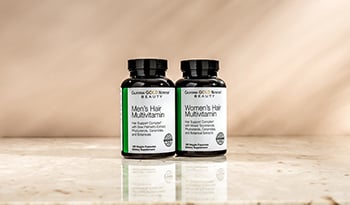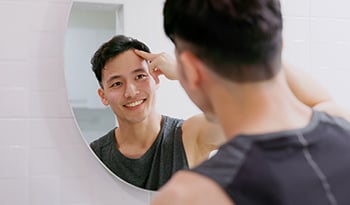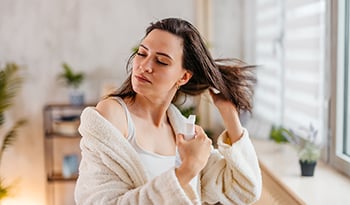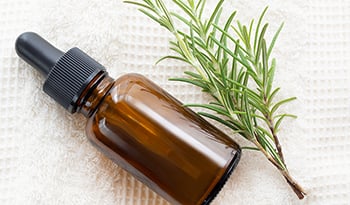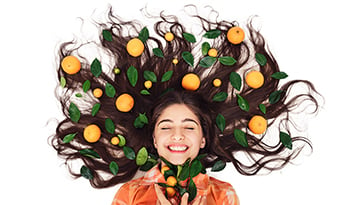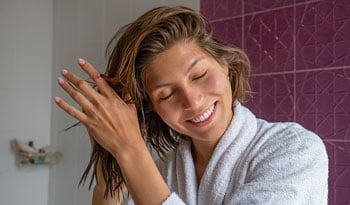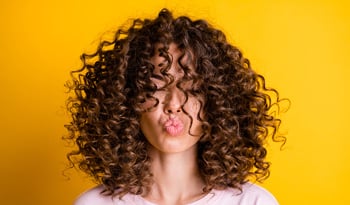Dandruff Natural Remedies: Shampoo, Hair Masks, Supplements, and More
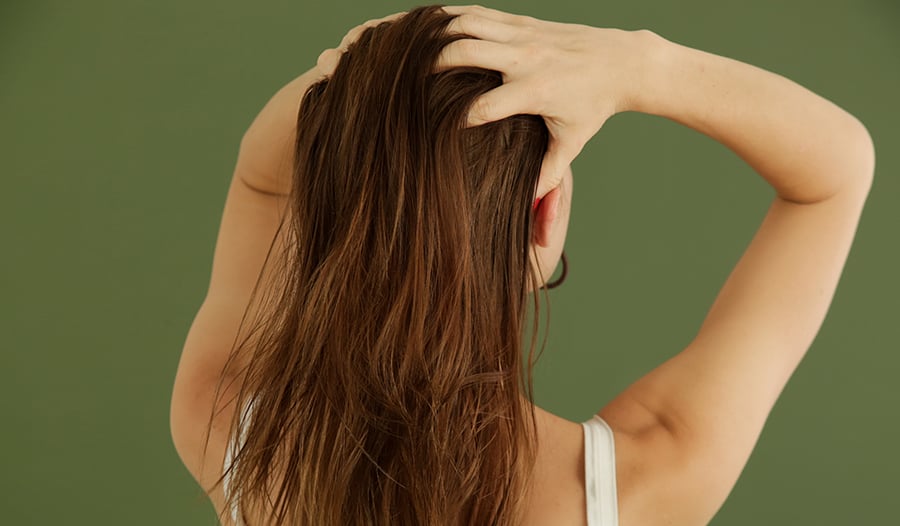
Originally Posted February 2018 / Updated 2023
Dandruff—those persistent flakes that fall from your scalp and land on your clothes, eyebrows, mustache, and furniture—can be embarrassing. And annoying, as you frequently reach up to scratch your head! Though dandruff isn’t contagious nor considered a serious medical condition, it is a nuisance that can flare up even more in cold or dry weather and when you’re stressed.
What Is Dandruff?
Dandruff is a mild form of seborrheic dermatitis1. It can develop from:
- Irritated skin
- Dry skin
- Oily skin
- Malassezia (a yeast-like fungus)
- Sensitivity to hair care products
According to the Mayo Clinic, dandruff generally starts in young adulthood and continues through middle age, particularly for males. Skin issues like psoriasis or eczema, some diseases that impact the nervous system, such as Parkinson’s, and having a weakened immune system can trigger dandruff.2
The Best Natural Ways to Handle Dandruff
Dandruff means your scalp is shedding dead skin cells. And because your scalp skin replaces itself roughly every month, dandruff can be ongoing. Many store-bought remedies contain harsh chemicals and ingredients that may make the problem worse in the long run. Instead, try these gentler natural and DIY remedies that provide great results.
Shampoo
Hair-washing is part of most people’s daily routine, so gentle shampoo with ingredients targeted to fight dandruff is a must. Look for ingredients such as 2% salicylic acid, zinc, aloe vera, tea tree oil, and/or chamomile. Studies suggest that essential oils other than tea tree oil may also be powerful anti-dandruff remedies. Herbal oils such as rosemary and lime contain aromatic secondary metabolites that offer antimicrobial properties.3
Tea Tree Oil
Many shampoos contain tea tree oil, but this is another one that you can DIY, too. Tea tree oil, or Melaleuca alternifolia, is both an antibacterial and an antifungal. Tea tree oil, and tea tree oil-containing shampoos, are good remedies when scalp fungal and/or bacterial infections are suspected.
Before using it on your scalp, test it by placing a drop or two on the skin inside your wrist. If you don’t have a reaction after about 10 minutes, you could try adding two drops of tea tree oil per ounce of shampoo. Close the shampoo bottle and shake vigorously before each use.
Herbs, Plants, and Minerals
Mother Nature’s toolkit contains additional tools that have been shown to help with dandruff. Some are found in hair care products, while others make for simple home remedies:
- Sapindus mukorossi, or wild soapberry, is an antibacterial and anti-inflammatory4 frequently found in shampoos and even beard treatments.
- Zinc Pyrithione is another effective treatment found in shampoos because the zinc particles are deposited and retained on the target skin surfaces even when delivered from rinse-off products.5
- Aloe vera can help when scalp itching is a concern. It’s found in shampoos but can also be used as a gel and massaged into the scalp for up to 30 minutes before shampooing.
- Fenugreek is another antifungal and antimicrobial DIY that you can leave on your scalp for about 30 minutes before shampooing. Simply soak 2 tablespoons of fenugreek seeds in 1 cup of water, then drain and crush them into a paste. Add a few tablespoons of apple cider vinegar to the paste and apply it to your scalp.
Dandruff Remedies From the Kitchen
You probably already have home remedies for dandruff at your fingertips—in your pantry! If you choose to try these, don’t try them all at once. Select one, try it for roughly two weeks, and see how it works for you. Not everyone gets dandruff for the same reasons, so what works for someone else may not be as effective for you. As always, direct any questions to your health practitioner and run these remedies by them before trying:
- Hair masks are all the rage and can help nourish your scalp with healthy fats. This can be important if anti-dandruff shampoos are drying out your scalp.
- Olive oil is sometimes included as an ingredient in shampoos but is a DIY favorite.
- Coconut oil is another option for dry scalp due to its moisturization and mild antimicrobial properties. To make a hair mask with it, make sure you have a shower cap, then massage one or two teaspoons of oil into your scalp. Cover with the shower cap and leave for a few hours. Then, shampoo. If you’re up for it, try adding a small amount of tea tree essential oil to your oil mixture. Make sure you only use one drop of essential oil per ¼ cup of oil.
- A made-at-home salt scrub may help rid your scalp of flakes. Salt, particularly sea salt, can help remove pesky, visible flakes from the hair. Simply rub a couple tablespoons of salt gently into your scalp, shake out, then shampoo and condition as usual. Be sure to ask your doctor if a salt scrub is safe for you to try.
- Baking soda can help reduce fungi, particularly from an oily scalp.
- Apple cider vinegar or white vinegar are acidic and can change the scalp’s pH to discourage neutral-to-basic yeast growth. If you and your doctor feel an imbalanced pH is at the root of your symptoms, try one part vinegar to one part water and add to a spray bottle. Then, once or twice a week, spritz your scalp. Wrap a towel around your head, and let it sit for up to one hour. Follow by shampooing.
Emerging Natural Therapies
Ongoing studies are investigating the next great treatment option for dandruff. You may already see some of these popping up in shampoos and topical treatments! I’m keeping an eye on these potential therapies:
Biotin and B Vitamins
Studies suggest a connection between biotin, vitamin B6, nicotinate, and pantothenic acid and a healthy skin and scalp surface, which can help to control dandruff.6
Microbiome Support
You’ve heard of the gut microbiome, but did you know your scalp has a microbiome, too? The same study notes that different “pathways”—N-glycan biosynthesis, for example, that’s linked to fungal cells adhering to the scalp—may create dandruff conditions, while others—pathways of vitamins, like the B vitamins above—can play a beneficial role in controlling dandruff.6 Ask your healthcare practitioner about general microbiome support and whether you may benefit from an oral prebiotic or probiotic.
The Bottom Line
Dandruff is an annoying, and sometimes embarrassing, but relatively harmless medical condition resulting in flakes shedding from the scalp onto clothes, facial hair, furniture, and other surfaces.
Thankfully, harsh chemicals are not required to manage dandruff. Various natural ingredients are currently incorporated into shampoos and topical treatments targeted at dandruff. And quite a few home remedies and DIY options may help ease dry scalp, treat oily scalp, and remove pesky flakes. Last but not least—there is hope! Research continues into natural methods for handling dandruff and its related scalp conditions.
References:
- Mayo Clinic, Patient Care & Health Information, Diseases & Conditions: Seborrheic dermatitis of the scalp. Accessed 5 January 2023.
- Mayo Clinic, Patient Care & Health Information, Diseases & Conditions: Dandruff. Accessed 5 January 2023.
- Shagun J, et al. "Essential Oils as Potential Source of Anti-dandruff Agents: A Review.” Bentham Science, vol. 25, issue 9, 2022, published 12 July, 2021, pp. 1411-1426, https://pubmed.ncbi.nlm.nih.gov/34254910/. Accessed 5 January 2023.
- Kunwar RM, et al. "Medicinal plants, traditional medicine, markets and management in far-west Nepal.” Published online 12 April 2013. https://pubmed.ncbi.nlm.nih.gov/23587109/. Accessed 5 January 2023.
- Schwartz JR. “Zinc Pyrithione: A Topical Antimicrobial With Complex Pharmaceutics.” Journal of Drugs in Dermatology, vol. 15, issue 2, 2016 February, pp. 140-4, https://pubmed.ncbi.nlm.nih.gov/26885780/ Accessed 5 January 2023.
- Saxena R, et al. “Comparison of Healthy and Dandruff Scalp Microbiome Reveals the Role of Commensals in Scalp Health.” Frontiers in Cellular and Infection Microbiology, published online 04 October 2018. https://www.ncbi.nlm.nih.gov/pmc/articles/PMC6180232/. Accessed 5 January 2023.
DISCLAIMER:This Wellness Hub does not intend to provide diagnosis...

















































































 Table of Contents
Table of Contents





